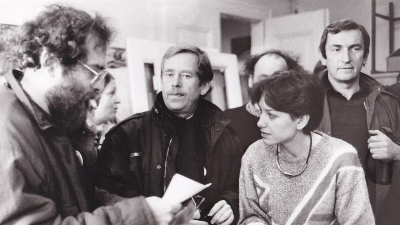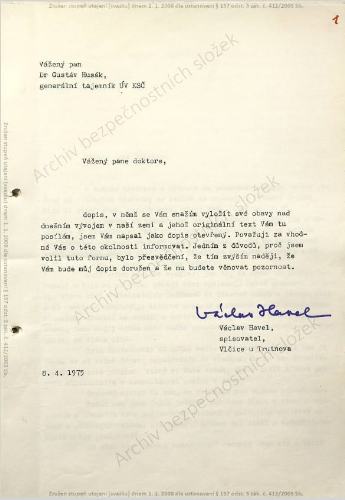
©
У Празі запустили онлайн-виставку Архіву безпекових служб, яка відкриває доступ до одного з найважливіших документів чеського дисидентського руху — відкритого листа чеського письменника, а згодом першого президента Чеської Республіки (1989) - Вацлава Гавела до генерального секретаря ЦК Компартії Чехословаччини Густава Гусака, написаного 8 квітня 1975 року. Ця виставка не лише знайомить з текстом самого листа, а й містить відповідь секретаріату Гусака, відгуки з-за кордону, а також історії викладачів Карлового університету, які поширювали цей документ в період репресій. Дослідник Архіву безпекових служб Радек Шхованек під час презентації виставки наголосив, що це один з найбільш значущих текстів, створених Вацлавом Гавелом. "Це глибокий аналіз стану чехословацького суспільства після шести років так званої нормалізації. Гавел описує приниження, страх і лицемірство, які стали нормою за комуністичного режиму", — зазначив Шхованек. Лист демонструє, як громадяни, виконуючи накази некомпетентних керівників, стикаються з абсурдними ситуаціями, що суперечать їхнім переконанням, водночас зберігаючи свою гідність, незважаючи на приниження. Хоча лист був адресований Гусаку, його розповсюдили й серед міжнародних агентств, таких як DPA, Reuters, AFP, а також кореспонденту Баварського радіо в Празі. Відомості про лист швидко стали відомими завдяки публікаціям у західній пресі та повідомленням «Радіо Свобода» й «Голосу Америки». Оригінал листа був вилучений під час обшуку в 1977 році і включений до слідчої справи.
Opening of the Czech Security Services Archives: 50 years Václav Havel's Letter to Gustáv Husák
An online exhibition has been launched in Prague by the Czech Security Services Archive, providing access to one of the most significant documents of the Czech dissident movement – an open letter from Czech writer and later the first President of the Czech Republic (1989), Václav Havel, to the General Secretary of the Czechoslovak Communist Party, Gustáv Husák, written on April 8, 1975. The exhibition not only presents the text of the letter itself but also includes Husák's secretariat's response, foreign reactions, and the stories of professors from Charles University who distributed the document during the period of political repression. Radek Schovánek, a researcher at the Czech Security Services Archive, emphasized during the exhibition's presentation that this is one of the most important texts written by Václav Havel. "It is a profound analysis of Czechoslovak society after six years of so-called normalization. Havel describes the humiliation, fear, and hypocrisy that became the norm under the communist regime," Schovánek remarked. The letter illustrates how citizens, following orders from incompetent leaders, face absurd situations that contradict their beliefs, yet maintain their dignity despite the degradation. Although the letter was addressed to Husák, it was also distributed to international agencies such as DPA, Reuters, AFP, as well as a correspondent from Bavarian Radio in Prague. The information about the letter quickly became known through publications in the Western press and reports from "Radio Free Europe" and "Voice of America." The original letter was seized during a raid in 1977 and included in the investigation file.

©
1226